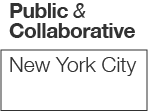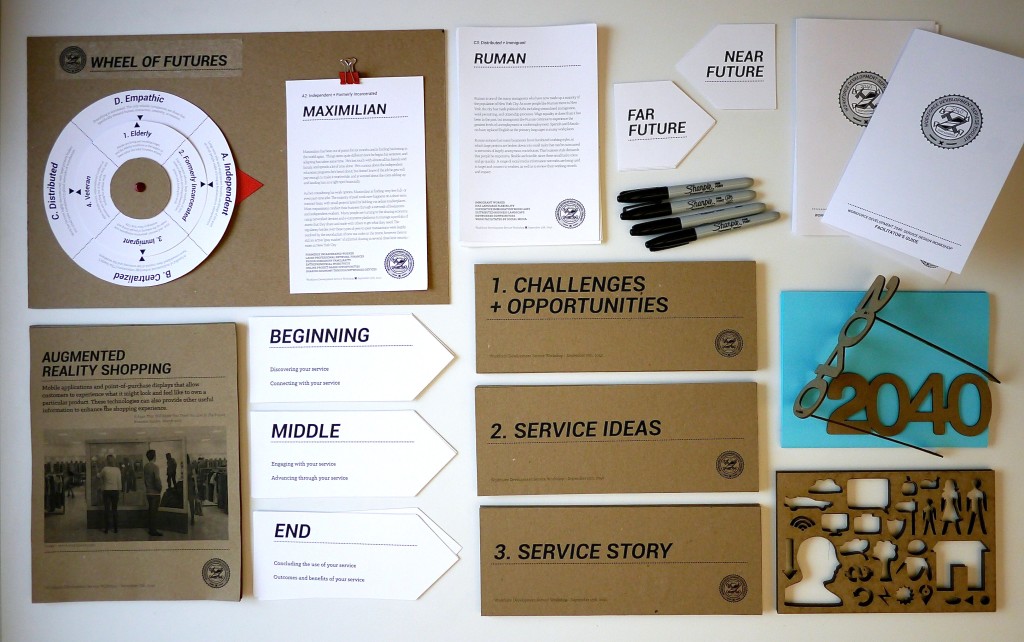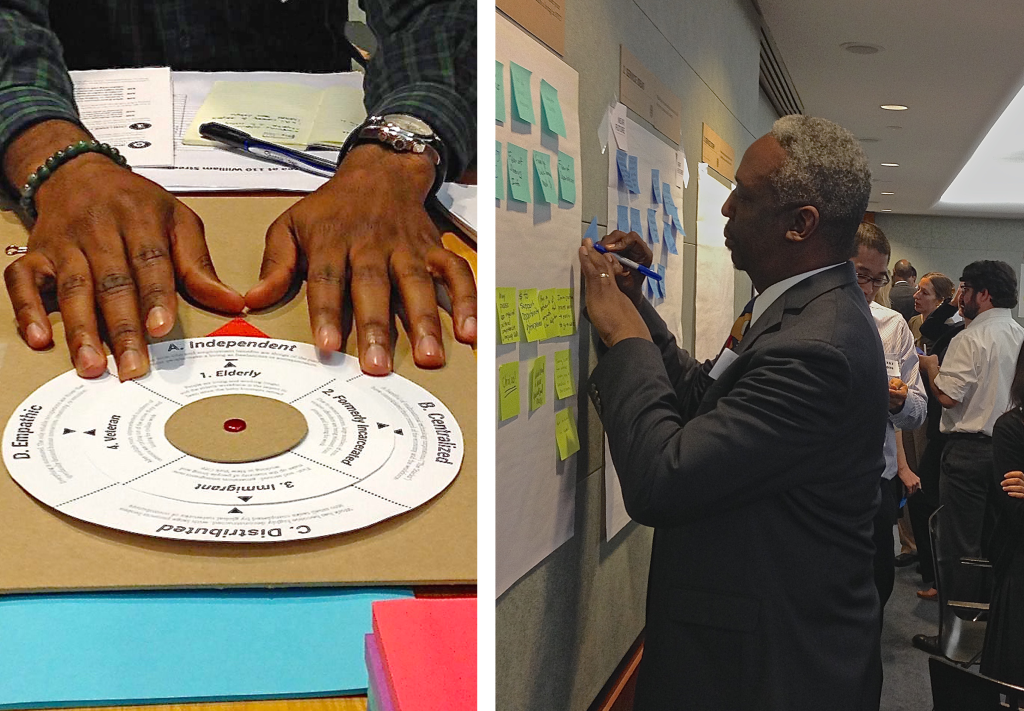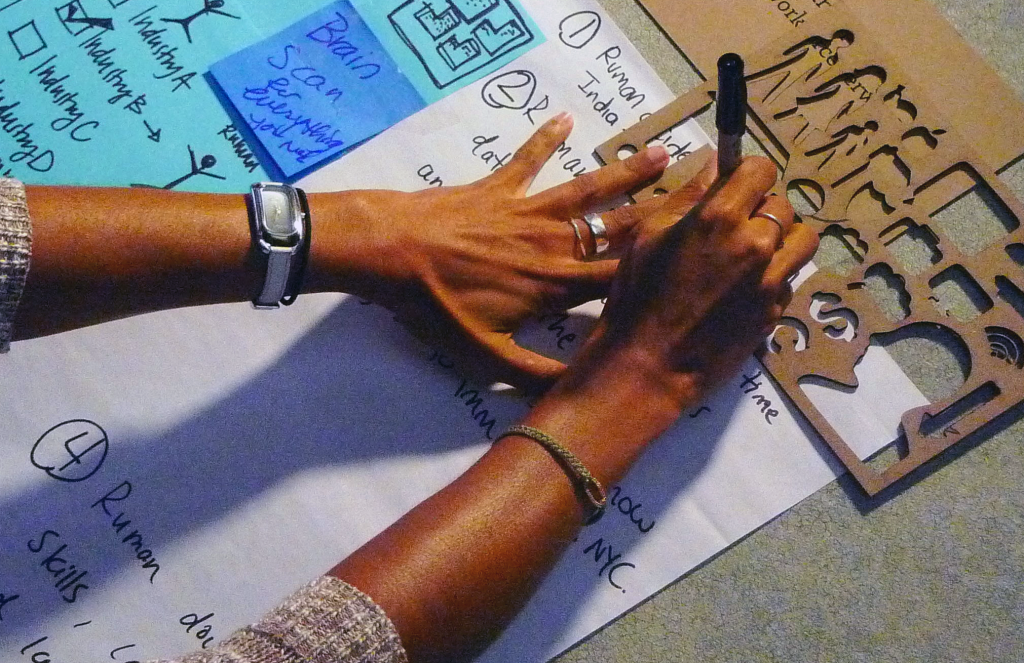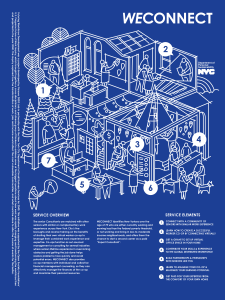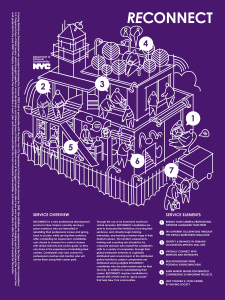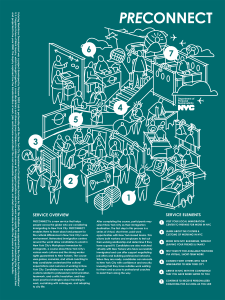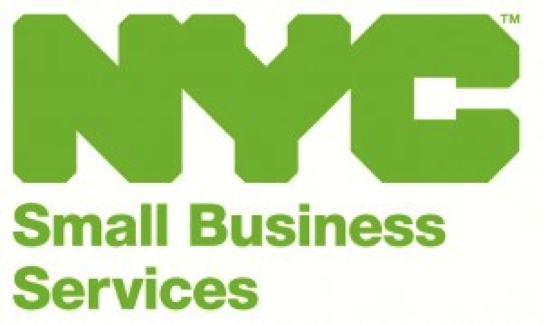Introduction
As a part of the Open Society Foundations’ (OSF) 2014 Future of Work inquiry, Parsons DESIS Lab (PDL) partnered with the New York City Department of Small Business Services (SBS) to explore the future(s) of workforce development in New York City. Over the course of several months, service designers and futurists from PDL and staff from SBS worked together to imagine new types of workforce development services that could benefit New Yorkers in the year 2040. The project team employed a hybrid methodology of “research through design,” involving human-centered and future-oriented service design techniques. The project was conducted in three phases: beginning with a “discovery” phase, in which PDL researched various forces and developments potentially shaping the future of work; followed by a “co-design” phase, in which a large group of SBS staff participated in a workshop to design workforce development services for different future scenarios; and concluding with a “synthesis” phase, in which the resulting future-service concepts were refined and visualized for further consideration. The goal of the project was not to predict the future, or to propose a singular vision or policy direction, but rather to explore the implications of multiple potential futures, and to generate new ideas about workforce development in the present.
Toolkit
The project began with several weeks of “horizon scanning,” during which PDL researched social, economic, and technological trends signaling or driving changes in the workforce landscape in New York City and around the world. Then, in close collaboration with SBS, PDL translated the findings of this initial research into a futuring framework and design toolkit that would help workshop participants envision and engage with potential workforce futures. This toolkit included a “Wheel of Futures,” which would allow participants to generate and select from a range of future scenarios by mixing and matching two key variables: different demographics of workers and different forms of work. Based on the scenario they created using the Wheel of Futures, participants would receive a corresponding Persona Card, explaining the situation and characteristics of a fictional New Yorker looking for work in the year 2040. The remainder of the toolkit included instructions, prompts, and examples intended to guide workshop participants through a human-centered design process for imagining a workforce development service to benefit their selected persona.
Workshop
The toolkit was introduced at a half-day workshop facilitated by PDL and attended by approximately thirty SBS staff from a variety of departments. The participants were divided into five teams comprised of a cross-section of Agency staff and spent the morning designing services for the future. Each team kicked off the design process by spinning the Wheel of Futures and getting acquainted with their chosen persona scenarios. They were then prompted to identify challenges and opportunities that their personas might face in trying to make a living in the year 2040. Next, the teams began designing speculative workforce services informed by their personas’ challenges and opportunities. Inspirational examples of futuristic technologies and instructional demonstrations of design techniques were provided along the way. In the end, the teams were asked to present illustrated storyboards of their service concepts, discuss any patterns or themes they noticed across the work of the entire group, and share their thoughts about the design process they had participated in.
Scenarios
The workshop was an opportunity for the SBS participants to look at workforce development from a new perspective and think about how various future scenarios might inform their current work. They demonstrated significant energy and enthusiasm for this new, creative, and divergent way of thinking and working, and noted that it was considerably different than the evidence-based approaches they are accustomed to in the workplace. The workshop teams created a diverse range of speculative workforce development services. However, it is worth noting that four of five teams chose to focus on future scenarios in which the predominant forms of employment would be highly independent or decentralized, and three of the five groups selected to focus on an immigrant population as the primary user group for their future services. After the workshop, the PDL and SBS project team reflected on all of the resulting service scenarios and selected three for further discussion and development. These scenarios were refined, illustrated, and branded as part of a speculative suite of services called “Workforce Connect,” which would be administered by a fictional future agency called “The Department of Personal Sustainability”. This added layer of design and detail was intended to unify the original service concepts in a vivid, accessible, and cohesive future scenario that could be shared with other City government officials and the audience for OSF’s Future of Work inquiry at large.
Outcomes
THEMES
Several notable themes emerged from the services concepts proposed at the workshop, while others arose from subsequent discussions, visualizations, and revisions of the Workforce Connect scenarios. For instance, most of the ideas imagined for workforce development in the next 20-30 years, focused on training and pairing qualified candidates with employers, although some also proposed brokering peer-to-peer connections and cooperative arrangements, and nearly all proposed to use technology to make this kind of professional matchmaking more accurate, personalized, or expeditious. Almost all of the concepts included an initial assessment of jobseekers’ interests and abilities as the basis for their professional development, and several offered to transform untapped social capital, cultural knowledge, or cognitive capacity into professional resources as well. Another common theme was the ability to anticipate individuals’ upcoming professional needs and provide preemptive workforce development services to help them avoid any lapses in employment.
Partners
Participants
Sara Schlossberg, Executive Director, Policy & Planning, SBS
Gary Johnson, Center Operations Manager, SBS
Eduardo Staszowski, Director, Parsons DESIS Lab
Benjamin Winter, Service Designer, Parsons DESIS Lab
Elliott Montgomery, Service Designer, Parsons DESIS Lab
Amy Findeiss, Service Designer, Parsons DESIS Lab
Yaprak Buyukteoman, Service Designer, Parsons DESIS Lab
